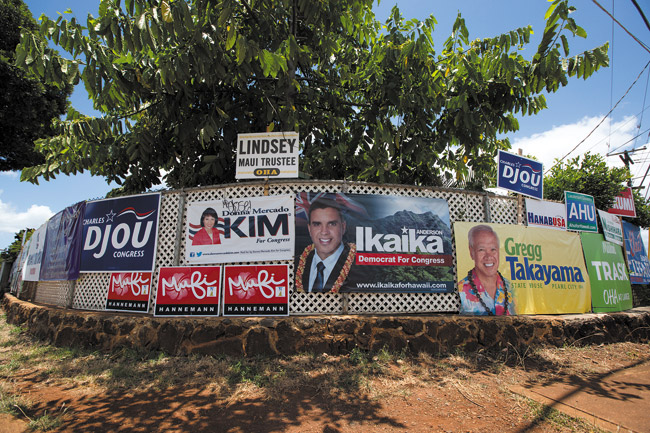The Calm Before The … Election

Signs on the corner of Waimano Home Road, Moanalua Road and Noelani Street in June during the primary campaign. ANTHONY CONSILLIO PHOTO
Check your favorite neighborhood political sign-bedecked fence. Lookin’ pretty empty, isn’t it? All those Abercrombie signs, all those Hanabusa banners, all those full-color Kim, Manahan, Anderson, Espero, Chang placards, even the few Xian: all gone, gone, gone.
So what’s left?
The discreet dark blue of Republican congressional candidate Charles Djou’s and Democratic gubernatorial nominee David Ige’s signs, the lighter-hued blues of Democratic congressional candidate Mark Takai and Sen. Brian Schatz, the simply Mufis, of course, and an occasional, lonely Cam Cavasso (and wife) for U.S. Senate banner.
That’s it. That’s it. Further evidence, if ever we needed any, that in a one-party state, in this case, a Democratic one, quiet descends following the party primaries.
Not quite. Looking at Ige’s overwhelming triumph over incumbent Gov. Neil Abercrombie, despite a 10-1 campaign funding disadvantage, more than one primary election night analyst was heard to say: “See? The candidate who spends the most money doesn’t always win.”
No, he or she doesn’t. But in an overwhelming majority of the time, the candidate with the most money wins because of his ability to make the most noise with yard signs, radio and television ads, and doorbell-ringing canvassers.
Sure, Abercrombie’s loud $5 million campaign did, indeed, lose to Ige’s $500,000 campaign.
But consider another $5 million campaign, that of Schatz. Five million George Washingtons took him from eight points down at the outset to 1 percent victory over U.S. Rep. Colleen Hanabusa on primary election day.
Hanabusa spent not an inconsiderable sum of money herself — in the neighborhood of $2.5 million. But Schatz deluged the electorate with television and radio ads, and what television and radio time he didn’t buy various political action committees bought for him. It was slick, smart and expensive — all the best that money can buy.
Between them, Abercrombie and Schatz alone made $10 million worth of 2014 primary campaign noise — more, I would venture, than all of Hawaii’s other gubernatorial and congressional primary campaigns combined.
To be sure, the post-primary election quiet will be broken, but it’s highly unlikely that it will reach the din occasioned by the Aug. 9 primaries. The reason?
Schatz does not have a well-financed opponent in the general, and none of the candidates for governor — not Republican Duke Aiona, Independent Mufi Hannemann or Democrat Ige — is an incumbent.
Money, really big money, loves an incumbent. Campaign contributions to incumbents constitute shrewd investments. To non-incumbents, they’re wagers.
Among non-incumbents, the only safe wager is to hedge your bets, a little for Duke, a little for Mufi, a little for David; but few contributors can afford a three-way split of their campaign investment dollars. Some can. Some do.
That leaves the congressional race in the 1st District, Republican Djou vs. Democrat Takai. Djou has name-recognition, can claim six months of seniority and faces a democracy fractured by its heated primary contests — that should draw at least a mild pile of national Republican cash to his campaign.
The same goes for Republican Aiona in the gubernatorial race. In the most recent Hawaii Poll, his 41 percent led Ige and Hanne-mann. Republican money will flow.
Hannemann and Ige, however, are scratching for cash. Rest assured, they’ll find some.
So enjoy the quiet, or what’s left of it.
dbboylan@yahoo.com





